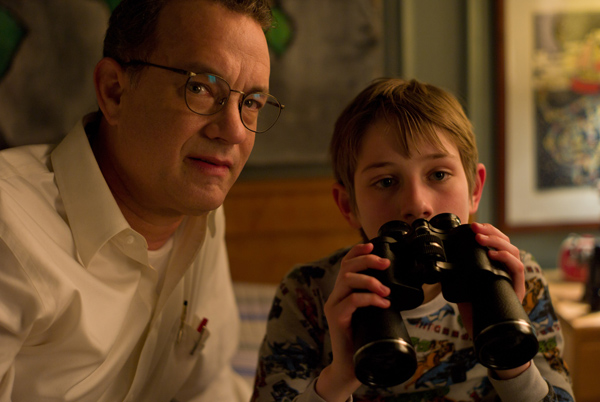
 For all its contrivances and inconsistencies, “Extremely Loud and Incredibly Close” worked for me. The tale of a boy searching all over New York City for a lock to fit a key left behind by his late father following 9/11 is the stuff of movie magic. But I was drawn in on a metaphorical level. Sometimes tragedy is best handled on screen indirectly.
For all its contrivances and inconsistencies, “Extremely Loud and Incredibly Close” worked for me. The tale of a boy searching all over New York City for a lock to fit a key left behind by his late father following 9/11 is the stuff of movie magic. But I was drawn in on a metaphorical level. Sometimes tragedy is best handled on screen indirectly.
Oskar Schell (Thomas Horn) was very close to his father Thomas (Tom Hanks). Sure, he was close to his mom too, what nine-year-old isn’t? But with his father, Oskar had a deep bond, one that continued well after Thomas’ death in the World Trade Center attacks of September 11th. Shortly after the tragic events of 9/11, Oskar finds a key in an envelope in a vase amongst his father’s things. The envelope has just one word written on it—the name “Black.” Over the next year or so, Oskar embarks on an expedition to find the lock that fits the key. A search is on, naturally inspired by his intrepid father, who would have wanted him to venture out and solve the mystery.
The journey taken by Oskar sends him all over the city where he meets interesting people. Some of the people are giving, some offer Oskar assistance, others want nothing to with him. The mystery seems unsolvable. Meanwhile, Oskar’s grandmother has taken in a mysterious tenant known only as The Renter (played by Max von Sydow). The Renter keeps to himself and for some inextricable reason no longer communicates through speech, rather, he writes his responses on pieces of paper. And as is required for the movies, the Renter has excellent and speedy penmanship. Feeling a kinship with this strange, lonely man, Oskar lets him in on his secret journey and the two explore together for a time. But nagging questions haunt Oskar. Who is this odd muted person? Why does his choose not to talk? And where’s the lock to fit his father’s key?
The mystery and the intricacies of Oskar’s expedition are a bit overdone. But like many solid Hollywood melodramas, there’s something sweet and emotionally connective underneath the layers artificial posturing. Nothing in the film seemed to me to be too false, especially the story involving the tragic events of 9/11. Hanks is well-cast as the father, but Sandra Bullock never seemed convincing as the loving and perennially mourning mother. There is a scene in which she breaks down with Oskar that fails to have the emotional impact that it should have achieved. Bullock’s name and reputation undoubtedly helped in raising funds for the production, but she is flat in the role.
Making his feature debut, Thomas Horn is a standout as Oskar. The character is a metaphorical creation through which the story explores the emotions experienced by the city and our nation following the 9/11 tragedy. Oskar is a special child who may have some particular condition like Asperger’s syndrome. In addition to his ease with number, especially counting, the boy delivers lengthy monologues that are so finely written that it is hard to believe they have been composed by an ordinary nine-year-old. The boy’s speech patterns and insight is a bit too advanced and the timing of his dialogue too perfect to be reflective of reality. But this is not reality, it is a narrative created to take us on a journey and make us think about our own lives and how we dealt with and continue to deal with the 9/11 events.
Using a child in this way to provide a chorus for the narrative is nothing new. The same device was used in “We Need to Talk About Kevin.” In that film, a mother reflects on the raising of her troubled child, but because we see the events only from her perspective and indeed from her own troubled memory, the child is depicted in adult situations with advanced understanding of them. Such characterizations and stylistic choices are acceptable, I think, when the underlying approach is a metaphorical exploration of reality. You see, the main criticism, I would imagine, of “Extremely Loud” is that it takes a serious historical event and builds a fake and, at times, contrived story upon the real-life foundation. But I see it another way, the truth of the 9/11 events may be too soon and too painful to explore in vivid detail. Sure, Oliver Stone chronicled one true story in “World Trade Center” back in 2006, and Paul Greengrass did a meditation on what may have transpired on “United 93.” But both of those films did not address the aftermath of the pain and suffering experienced by our nation and those immediately touched by the tragedy. And in its artificial and metaphorical way, “Extremely Loud and Incredibly Close” manages to indirectly give us a bit of the emotional journey many of us have and are to this day continuing to experience.
Directed by Stephen Daldry whose films include “The Hours” and 2008’s terrific “The Reader,” “Extremely Loud” will remind some viewers of his wonderful movie “Billy Elliot.” Both films give us boys dealing with serious events in their lives in creative and unusual ways. While “Extremely Loud” isn’t as good as “Billy Elliot,” it will certainly captivate many viewers with its rousing soundtrack and indirect handling of tragic events.

